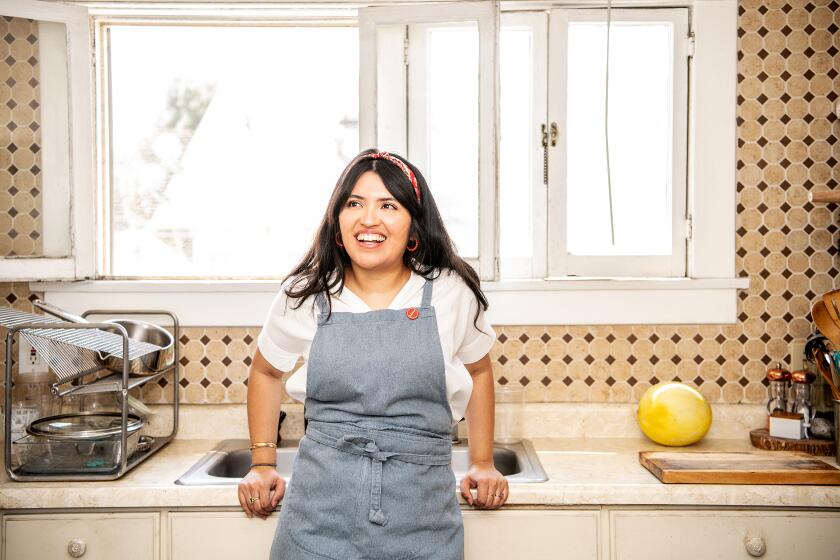A label of his own
- Share via
Ed SBRAGIA has been a winemaker at Beringer Vineyards for 28 years, and in almost every one of those years, he and his boss have sat down for what Sbragia characterizes as “our annual ‘What’s Ed going to be when he grows up?’ discussion.”
A few years ago, Sbragia finally came up with an answer:
“I want to do something with wine that’s for my kids -- and maybe with my kids -- something that capitalizes, for their benefit, on what my dad started when he came here as an Italian immigrant with a borrowed $300 in 1927.”
Thus was born Sbragia Family Vineyards, which next spring will release its first seven small-production wines -- three Cabernets, two Chardonnays, a Merlot and a Zinfandel.
Sbragia became Beringer’s chief winemaker in 1984, more than a century after the winery was founded, in 1876, by two German immigrant brothers, Jacob and Frederick Beringer. It’s California’s oldest continuously operating winery. It’s also one of the state’s biggest -- and best -- thanks in no small measure to Sbragia’s style of winemaking. His $100-a-bottle Private Reserve Cabernet has become one of the state’s benchmark wines.
Sbragia, 55, is a burly, bearded, blunt-spoken bear of a man whose ruddy complexion suggests he has spent more than his share of time under the sun, in his vineyards and at table, drinking the bottled fruits of his labors.
Not surprisingly, he makes wines in keeping with his forceful persona, what he calls “full Monty” wines -- big, full-bodied, broad-shouldered wines whose polished tannins somehow enable them to maintain a certain balance and even elegance.
Here’s critic Robert Parker on the 2001 Private Reserve Cab:
“It is fabulously rich, with majestic voluptuousness, an inky, opaque purple color and a finish that lasts for 45 seconds.”
Sbragia says that although he’ll continue as Beringer’s winemaker, he’s looking forward to also spending time on the much smaller Sbragia Family Vineyards operation, producing hundreds of cases rather than millions.
It’s a most unusual arrangement, an opportunity that Sbragia says he is “truly grateful” to Beringer for providing.
Will the Sbragia Family Vineyards wines be different than those he’s made for Beringer?
“No,” he says sharply, almost before I can finish asking the question. “They’ll be robust. It’s what I do and who I am. I’m not going to change the way I make wine. I make the kinds of big, rich wines I like to drink. The Family Vineyards Cabernet will be a lot like the Beringer Private Reserve, a real intense, in-your-face Cab, and the Chardonnay -- well, I want to make white wines that are like a Batard-Montrachet. I love that big, butterscotch, creme brulee character.”
“Big” is a word Sbragia often uses when talking about his wines, and when I asked him over lunch recently if he also liked “big” Pinot Noirs, he just laughed.
“I tend to go for everything a wine has to offer,” he said. “You need more restraint to make a good Pinot. Restraint isn’t my game. So I leave the Pinots to our other winemakers.”
Although Beringer has changed hands three times in the last 35 years, moving from family ownership to ever-larger corporate parents, it has retained its reputation for excellence, and much of that is attributable to Sbragia’s determination to produce high-quality wines.
Parker has reviewed Beringer wines after each of the ownership changes, and he has always paid tribute to Sbragia. He did so most recently in the Wine Advocate in December, when he mentioned Beringer’s acquisition by “the humongous Australian conglomerate, Mildara-Blass,” which is owned by an even larger company, Fosters Group, also based in Australia.
Beringer-Blass Wine Estates now produces about 15 million cases of wine a year, more than 1 million of which are produced by Beringer. But Beringer “remains a model of how a large winery owned by a foreign conglomerate can continue to stay on top of the qualitative game when it comes to winemaking,” Parker wrote. “Fortunately, their chief winemaker, Ed Sbragia, remains in charge.”
Parker went on to give ratings of 90 points or more to 18 of Sbragia’s new wines, including the 2001 Private Reserve Cabernet (94-96) and the 2002 Limited Release Chardonnay (95).
The Wine Spectator has been equally laudatory, often awarding ratings of 95 or more to the Private Reserve Cab and naming the ’86 the No. 1 wine in the world in 1990. In his 1995 book, “California Wine,” the Spectator’s James Laube wrote, “All things considered, Beringer Vineyards is a candidate for California’s best all-around winery.”
Personal venture
But now, Sbragia wants to aim for that level of quality on a much smaller, far more personal level, in a venture that epitomizes his sense of family. He wants to work with his own children on a project that bears the family name and that, ultimately, will belong to them.
His family -- his roots -- mean everything to him. His mother died in 1993, his father in 1996, but he still lives in his parents’ house in Healdsburg.
On the day we had lunch, he was planning a trip to Tuscany, where he’s been trying for two years to buy his grandparents’ old home, set on three acres in a small village four miles northeast of Lucca. (Castello di Gabbiano, the Tuscan winery, is part of the same conglomerate as Beringer, and since 1985, Sbragia has been visiting often to help make the winery’s Super Tuscan, Alleanza.)
“My grandfather came here from Tuscany around the turn of the century,” he says. “He worked in wineries, starting at Italian Swiss Colony. My dad was born here and then the family went back to Italy, and when my dad came back in 1927, he also worked at Italian Swiss Colony before he bought his own vineyards. He grew Zinfandel grapes that he sold. He didn’t really have a winery, but he did produce some of his own homemade wine, and he really taught me how to make wine.
“When I was growing up, I worked with him, and he kept telling me what a natural process winemaking was, that all you needed was good land, good grapes and good techniques and you’d make good wine. In fact, he always said that if you fully extract it and don’t interfere with it, the wine will practically make itself.”
The Sbragias drank wine with dinner every night, and young Ed thought it was bitter, not much fun to drink -- until he turned 14. Then, suddenly, drinking a bottle of his dad’s Zin one evening, “I got it. I loved it. And I’ve been in love with wine ever since.”
But hard work in his father’s vineyards as a teenager initially soured Sbragia on a career in winemaking. The work was too hard, “the rows were too long, and I had hoed too many vines,” he says.
He went to UC Davis to study chemistry, not oenology, planning on a career in science. But he soon changed his mind and decided he wanted to make wine after all.
After his graduation from UC Davis, he earned a master’s degree in oenology at Cal State Fresno, and a year later, he went to work as assistant winemaker under Myron Nightingale at Beringer. The next year, Nightingale made the winery’s first Private Reserve Cabernet, and when he retired in 1984, Sbragia took the top job -- and took the Private Reserve Cab to new heights.
All in the family
Now, Sbragia’s elder son, Adam, 24, is working at San Clemente Winery, and Sbragia says he also sees signs of incipient winemaking interest in his 15-year-old son, Kevin.
“When Kevin was 10,” Sbragia says, “he asked my boss at Beringer, ‘When I grow up and become the winemaker here, will you let my dad hang around for the first couple of days after I start?’ ”
Sbragia laughs when he tells the story. “I don’t know that I’ll ever really leave Beringer,” he says, “so that shouldn’t be a problem. But I would like to spend more time on our family wines, and Beringer has agreed to let me do that -- and to help me market them.
“Who knows, maybe in about 10 years, I’ll focus on those wines full-time and just be a consultant to Beringer.”
Let’s see -- 10 years. Adam will be 34. Kevin will be 25. Sbragia’s daughter, Gina, will be 30. Though she’s in college now, studying medicine, Sbragia says she’s “the best taster in the family.” Forget Beringer. Maybe the three Sbragia offspring could run Sbragia Family Vineyards together. With dad as a consultant, of course.
David Shaw can be reached at david.shaw@latimes.com. To read previous “Matters of Taste” columns, please go to latimes.com/shaw-taste.
More to Read
Eat your way across L.A.
Get our weekly Tasting Notes newsletter for reviews, news and more.
You may occasionally receive promotional content from the Los Angeles Times.










